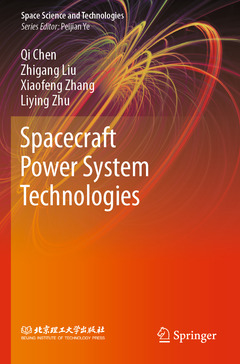Spacecraft Power System Technologies, 1st ed. 2020 Space Science and Technologies Series
Auteurs : Chen Qi, Liu Zhigang, Zhang Xiaofeng, Zhu Liying

This book provides an introduction to the main design principles, methods, procedures, and development trends in spacecraft power systems. It is divided into nine chapters, the first of which covers the classification and main components of primary power system design and power distribution system design. In turn, Chapters 2 to 4 focus on the spacecraft power system design experience and review the latest typical design cases concerning spacecraft power systems in China. More specifically, these chapters also introduce readers to the topological structure and key technologies used in spacecraft power systems. Chapters 5 to 7 address power system reliability and safety design, risk analysis and control, and in-orbit management in China?s spacecraft engineering projects. The book?s closing chapters provide essential information on new power systems and technologies, such as space nuclear power, micro- and nano-satellite power systems, and space energy interconnection systems. An outlook on future development trends rounds out the coverage.
Date de parution : 08-2021
Ouvrage de 307 p.
15.5x23.5 cm
Date de parution : 08-2020
Ouvrage de 307 p.
15.5x23.5 cm
Thèmes de Spacecraft Power System Technologies :
Mots-clés :
Power Distribution System; Spacecraft Power System Reliability Design; Technical Risk Analysis of Power System; Power System On-Orbit and Management; Battery Management on Orbit; Power System Autonomous Management; Communication Satellite Power System; Navigation Satellite Power System; Remote Sensing Satellite Power System; Manned Spacecraft Power System; Deep Space Probe Power System; High Voltage and High Power of Power System; Wireless Power Transmission Technology; Space Nuclear Power; Micro and Nano Satellite Power System; Space Energy Interconnection System



